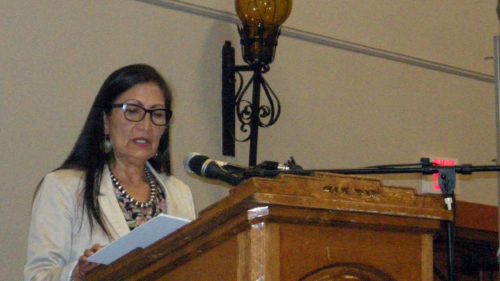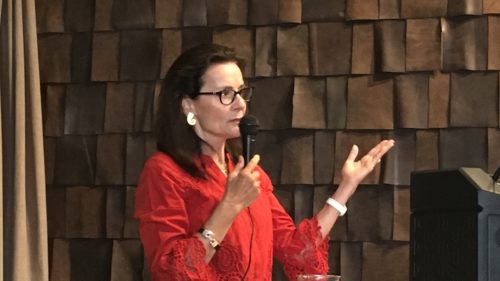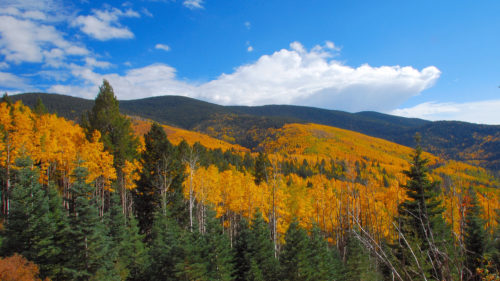By BEN NEARY
NMWF Conservation Director
ALBUQUERQUE — Dr. Karl Malcolm doesn’t take New Mexico’s wilderness for granted. And, he says, neither should the rest of us.
Malcolm, regional wildlife ecologist for the Southwestern Region of the U.S. Forest Service, has seen enough of the rest of the world to recognize that New Mexico, birthplace of the wilderness movement, is special.
Malcolm drew a capacity crowd Wed., May 15, to his free talk on wilderness at the Marble Brewery’s Northeast Heights location. The New Mexico Wildlife Federation organized the event.
Malcolm opened his talk by joking that he had feared perhaps only his wife and young daughter would turn out to hear him speak.
“But the fact that they’re trying to figure out how to get more chairs in here is really a testament to the legacy of the Southwest and New Mexico in particular being a place where people and wild places and wild animals have a very deep history,” Malcolm said. “And I’m guessing, based on the fact that you chose of your own volition to spend your Wednesday night at a venue like this, at a talk like this, that you’re part of that legacy.”
The Gila Wilderness, created in 1924 at the urging of Aldo Leopold, was the world’s first designated wilderness. Leopold also was the founder of the New Mexico Wildlife Federation.
Hunting and fishing has driven the designation of wilderness since the beginning, Malcolm said. He said Leopold saw the need to protect places big enough for a two-week pack trip for hunting and fishing.
Nonetheless, Malcolm said it’s now clear that no matter how large a wilderness area may be, none is immune to the effects of human activity such as burning fossil fuels.
Malcolm said he recently came back from a week-long trip turkey hunting in the Gila Wilderness, an experience that left him feeling recharged, but also more appreciative of modern conveniences.
Malcolm said he was happy to get back behind the wheel after so many days of backpacking.
“After putting on a bunch of miles in the Gila, being able to sit down in a leather chair and step on a pedal that propels you down the road” was something special, Malcolm said.
Malcolm received his PhD in Wildlife Ecology in 2011 for his studies on the role of nature reserves in sustaining biodiversity in southwestern China. He completed the degree through a joint appointment with the University of Wisconsin-Madison and the Smithsonian Conservation Biology Institute.
“In some of the places where I did my research in China, if you didn’t have a permit, you couldn’t go there,” Malcolm said. “Whether you were a member of the Chinese citizenry or an international guest, they were established for the protection of wildlife, but closed to the public.”
Malcolm said many people in the United States take public lands for granted. “But the opportunity to be able to go out and recreate — operate as though these places belong to you, because they do — that is unique, and not every country that has a de facto federally administered public lands system has that,” he said.
“If I’m going to Cruces Basin and slay a bunch of non-native brook trout, I don’t have to ask anybody’s permission,” Malcolm said. “I just show up and do it. Experiences like this, this is what brought me to New Mexico.”
Easy and open access to public lands increasingly is a draw for people who can decide where they want to live around the country. “Access to these public lands is a big deal,” Malcolm said. “There’s a reason the Front Range has exploded.”
And Malcolm said it’s easy for Albuquerque residents to take for granted that there’s a wilderness area in the Sandias that they can look at every day.
Malcolm showed a 1903 photograph of President Theodore Roosevelt standing with John Muir, a pioneering conservationist.
Malcolm said he appreciated the fact Roosevelt, founder of the Boone and Crockett Club — a hunting group — and Muir, a founder of the Sierra Club, were able to work together to protect Yosemite.
Malcolm said he sees too much division among various groups today, down to the level that hunters will squabble among themselves over what type of equipment to use. He said it’s important to keep in mind that we all care about the same things.
“It’s the stability of human habitat,” Malcolm said. “We all want a place where the air is clean. Where the water is clean.”



